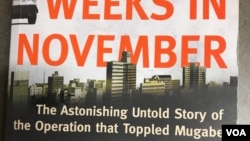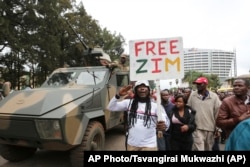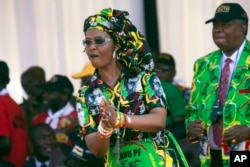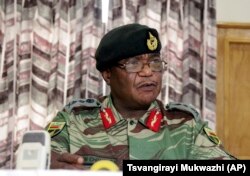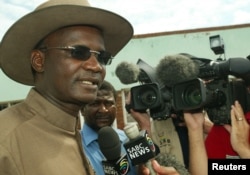A U.S.-based author has detailed the ouster of Zimbabwe’s long-time ruler, Robert Mugabe, by the military, in a book titled, Two Weeks in November: The Astonishing Untold Story of the Operation that Toppled Mugabe.
As a journalist, Douglas Rogers hit a jackpot, one could say, by being in Zimbabwe just before the military toppled Mugabe. Born in Zimbabwe where he still has a family, Rogers, was on holiday with friends in neighboring Mozambique when the events leading to Mugabe’s ouster, unfolded. The travel author, who now lives in the U.S., said he was in the region by coincidence.
“I was there to write a travel story about a road trip I was taking from Zimbabwe through Mozambique with some friends, three friends of mine, and it was going to be a bit like the movie The Hangover - four guys in mid-life crisis on an adventure. And a couple of days into the trip into Mozambique on this road trip, we heard that the vice president, (Emmerson) Mnangagwa had been fired. A few days later, he arrives in South Africa, and says that…he escaped the country, he arrives in South Africa, and says he's going to be back in two weeks, which I thought was ludicrous.”
Rogers said he realized Mnangagwa’s ouster, coming at the height of the internal wrangling in the ruling Zanu-PF party between Mugabe’s wife, Grace, and Mnangagwa, was the beginning of something bigger. His journalistic instinct kicking in, Rogers said he persuaded his friends to head to Zimbabwe, after hearing a press conference by then army chief General Constantino Chiwenga, basically threatening military action on Mugabe and his wife.
“I knew that something big was gonna go down in Zimbabwe and I told my friends let's go back for that. And I returned to Zimbabwe took a couple of days… In time for …. the military had already intervened. I think it was on the Tuesday I returned on the Wednesday or Thursday I was there for the big march and Saturday. And witnessed what seemed like a movie.”
After some digging, Rogers said he called his publishers and pitched the idea to drop the travel story, and instead write a book on the end of an era in Zimbabwe, which his publishers liked, and “Two Weeks in November: The Astonishing Untold Story of the Operation that Toppled Mugabe,” was born. Rogers tells the story, which reads like a movie, through a person he identifies in the book as Tom Ellis, a white Zimbabwean living in South Africa, who played a key role in the military intervention that ended Mugabe’s 37-year rule.
“… The guy is a white Zimbabwean living in South Africa, has been involved in opposition politics for a long time. And he began to tell me on a phone call what he had done in the coup, what he said my side, ‘I will tell you my side did’. And I listened to the story, it involved him meeting and befriending a CIO agent sent down from Harare to assassinate him … This is a guy called Kasper … It’s an unlikely friendship between these two over many months and many beers.”
Through Ellis, Rogers said he gained critical insight into the complex network of strange bedfellows who orchestrated the military intervention that ended Mugabe’s rule, dating back to 2015 - long before Mnangagwa’s firing.
Prominent characters in the book include a Central Intelligence Organization operative identified only as Kasper, then war veterans’ leader Chris Mutsvangwa, Gabriel Shumba, a human rights lawyer and activist, and members of the Zimbabwe Defence Force. Rogers recounted what Ellis told him about how he and Kasper, the CIO agent, essentially sealed the plan to topple Mugabe, in a parking lot in South Africa, in a pact called the Northgate Agreement.
“You know a black Zimbabwean CIO agent and a white Zimbabwean ex-Zimbabwean businessman sitting in a truck in a parking lot in Johannesburg to say we've got a plan. What their plan ended up being is that they wanted to support Mnangagwa. They wanted to support the Lacoste faction and have Mnangagwa as the new president of Zimbabwe. And at that first and this is goes for I believe Gabriel and some of these other guys who were caught up in it. It was activism, they were involved in activism and they thought this would take a long time …”
In an extensively researched and greatly sourced book, Rogers sought first-hand accounts from all the major players involved in the events leading up to Mugabe’s ouster, and the mystery surrounding Mnangagwa’s whereabouts when he was fired. Rogers detailed Mnangagwa’s dramatic escape to South Africa, as told to him by various people including Mnangagwa’s two sons who were with him, which involved walking on foot, dodging roadblocks, and seeking refuge in a shebeen, before being flown to Mozambique in a private aircraft owned by Justin Maphosa, a Zimbabwean business mogul based in South Africa.
“They get a warning that ‘You better leave tonight. People are coming to kill you.’ And that's when was put in motion and it's a crazy story and I don’t’ know this is being questioned by people but I've spoken to nine sources. I have WhatsApp messages. This is incredible.”
Rogers also spelt out the role played by then Commander of the Zimbabwe Defence Forces General Constantino Guveya Chiwenga, and the behind the scenes diplomatic negotiations that took place to ensure that no blood was shed in the process of removing Mugabe, and building the case that what happened was not a coup. Rogers explained the role by former Zimbabwean Ambassador to China, Chris Mutsvangwa.
“… But then bringing in very powerful players like Chris Mutsvangwa, to spin this operation and to run the media, international diplomacy, communications which became pivotal to the events that the military carried out. What Mutsvangwa was brilliant in was spinning and talking to the South African government and Jacob Zuma at the time was head of SADC and he and I they'd been doing this for a long time but saying that you do not want G40 in charge at the moment you do not want Grace Mugabe running Zimbabwe. And conveniently for him and for the cost of what they were the G 40 and Grace were their worst enemies because of her behavior the way she attacked war veterans, the way she attacked Mnangagwa at rallies. The behavior was a bad PR move by the G40.”
Rogers also reveals the cunning and pervasive way Zanu-PF stayed ahead of events and political rivals, by infiltrating systems. For instance, Kasper, the CIO agent, was the bodyguard of the late founder and leader of the opposition Movement for Democratic Change, Morgan Tsvangirai.
“… Zanu-PF, Mugabe were always one step ahead of the MDC and I think Kasper had infiltrated them and knew what they were up to and this is how Zimbabwe politics has worked I think since at least 2000 but probably before but it works on this powerful intelligence apparatus, an informer network which basically is able to predict and understand what opposition parties do.”
Two Weeks in November, a 252 page book, was published in South Africa. Rogers says he hopes the book will help Zimbabweans and the world, better understand the complex nature of Zimbabwe’s politics. Some critics say the book appears to have some fictitious characters but Rogers has dismissed such suggestions, noting that only members of Zimbabwe’s Defence Force declined to talk to him about their role in the military intervention.




